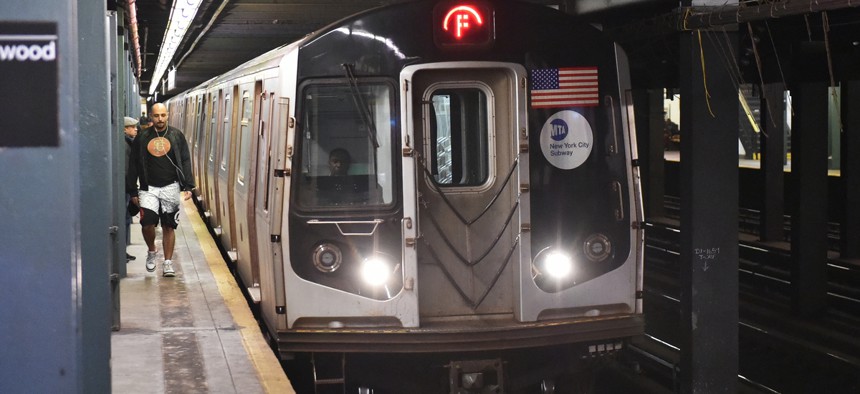Riders Aren't Quitting Transit—Just Using It Less Often

Private cars provided the biggest competition for transit, particularly in places like New York, where riders cited unreliability of transit as a main complaint. Shutterstock
New research from a transit-reform nonprofit found that riders are likely to return to public transit if service improves.
Transit ridership is declining in major cities across the U.S., but new research suggests that riders are using public transportation less frequently rather than giving it up entirely—meaning transit agencies may be able to lure them back with improved service.
“Abandoners, who no longer ride transit at all, were responsible for just 25 percent of total ridership decline,” according to “Who’s On Board 2019,” a recent report from TransitCenter, a nonprofit organization that promotes transit reform. “This finding suggests that while transit does not meet riders’ needs as well as it did two years ago, riders still rely on transit for some trips.”
To compile the report, researchers surveyed roughly 1,700 transit riders in seven cities (New Orleans, Denver, Los Angeles, New York, Pittsburgh, Seattle and Chicago), asking how their habits have changed in the past two years—and why.
Results showed that daily transit riders and full-time commuters are on the decline, down from 41 percent two years ago to 32 percent today. “Occasional” riders now comprise 42 percent of ridership, up from 29 percent two years ago.
In most cities, private cars rather than ride-sharing services provide the biggest competition for public transit. In five of the seven cities included in the survey, people were most likely to eschew transit to use their own vehicles.
“Respondents who acquired a car during the two-year survey period cut their transit use five times more than people whose car access stayed the same or declined,” the report says. “And with the expansion of cheap credit for car loans, vehicle ownership is on the rise.”
The increase in private car usage is largely because riders have a negative opinion of transit, viewing it as unreliable, infrequent or plagued by delays.
“People are driving more because in places built for cars, transit isn’t meeting their needs,” the report says. “Even in transit-rich cities, poor service quality is pushing people into cars: Riders in New York and Chicago were disproportionately likely to cite worse transit service as a reason for driving more.”
In some cities, notably Chicago, New York and Washington, D.C., transit agencies do face stiff competition from ride-sharing companies like Uber and Lyft. But even in those places, agencies are more likely to woo riders by focusing on improved service rather than pushing legislation or regulations that target ride-sharing. Respondents told researchers that they’d be much more likely to utilize transit if the quality of the service improved, and some cities have seen ridership spike after expanding services and implementing new features.
“Transit agencies can adopt all-door boarding to speed buses, use data-driven dispatching to improve bus reliability, and build shelters to give riders a dignified experience waiting for the bus. Running more service on high-ridership routes or redesigning outdated bus networks for current travel needs will make transit more convenient for many riders,” the report says. “In cities including Seattle and Austin, these methods have made bus service more competitive with driving, and ridership is going up.”
The report notes that there are contributing factors that transit authorities can’t control, including infrastructure issues, population shifts and economic booms or recessions. But even within those constraints, there are options for improving ridership, researchers concluded.
“Reliability and frequency in corridors of great demand, connectivity, stop facilities, and cleanliness are service characteristics within the agency’s power to improve, and we found that they are important factors of rider satisfaction,” they wrote. “And higher satisfaction with transit ...is associated with higher transit use: almost one extra day a month, even controlling for age, home and work location, changes in income, and other demographic and household factors.”
Kate Elizabeth Queram is a Staff Correspondent at Route Fifty and is based in Washington, D.C.
NEXT STORY: White House unwraps broadband strategy





